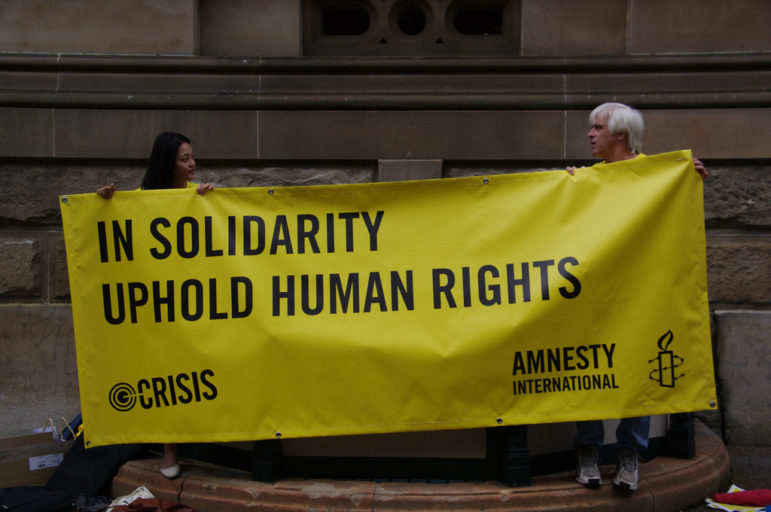
November 2, 2016; BBC News Europe
Employees at the Moscow offices of Amnesty International arrived for work on Wednesday only to find that authorities had closed off their offices. Official seals blocked all entrances, the locks were changed, and the power was shut off.
In the context of an environment inimical to civil society and human rights organizations in particular, one might assume that Amnesty was being invited to depart the country, as other civil society organizations have already done. Still, in a low-key reaction, the organization expressed hope that there was “a simple administrative explanation” for the whole thing. Eventually, a city authority said their lease had expired. (The office was, indeed, rented from Moscow’s Department of City Property.)
John Dalhuisen, Amnesty International’s Europe director, says the group had no advance warning. “Given the current climate for civil society work in Russia,” he said, “there are clearly any number of plausible explanations, but it’s too early to draw any conclusions.” He said that the organization was “100% sure” that they had fulfilled their obligations as a tenant.
The following day, Mikhail Fedatov of the Russian Human Rights Council apparently met with President Vladimir Putin; after that, Dalhuisen informed Reuters that Vladimir Yefimov, head of the Moscow city property department, explained there may have been a mix-up.
Sign up for our free newsletters
Subscribe to NPQ's newsletters to have our top stories delivered directly to your inbox.
By signing up, you agree to our privacy policy and terms of use, and to receive messages from NPQ and our partners.
In the context of crackdowns on foreign-funded NGOs, Amnesty has been highly critical of Russian authorities, especially and most recently over the killing of large numbers of civilians through its support of air attacks in Aleppo, Syria they claim are aimed at driving all residents from the eastern section of the city. (In this terrifying report, the details of what that looks like are laid out.) The organization has called on the UN General Assembly to step in, saying, “The scale of the bloodshed and destruction wrought on eastern Aleppo city over the past month is harrowing. Syrian government forces, with the support of Russia, have launched relentless attacks that have flagrantly disregarded fundamental rules of international humanitarian law.”
NGOs in general, let alone advocacy organizations such as Amnesty, face harassment and reprisals under Russia’s “foreign agents” law, while NGO access to foreign funding is further restricted by a law banning “undesirable” organizations. This is a story NPQ has been reporting on for years. The real story, of course, is in Amnesty’s insistence on having the truth of what is occurring in Aleppo be heard so, please, if you read this newswire, also watch the video to understand the waste that has been laid to that city and imagine for a moment that this is your neighborhood and that your family is being forced to flee into the mouth of more desperate and unknowable danger. Perhaps then, we can all see the importance of outspoken advocates like Hamdi Ulukaya.
—Ruth McCambridge













